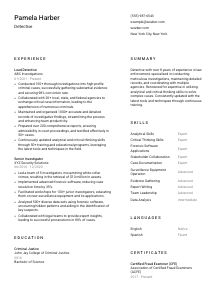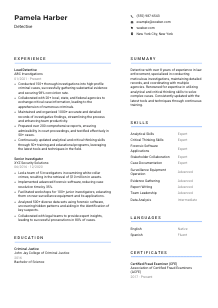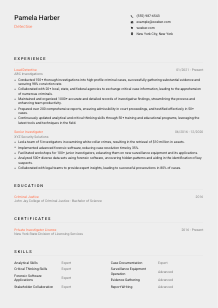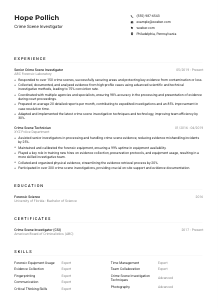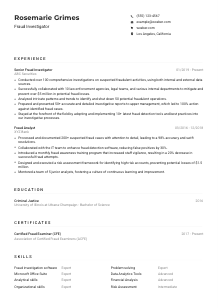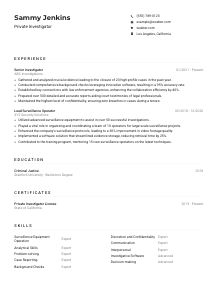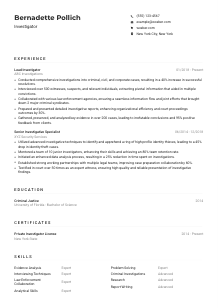Detective Resume Example
Cracking cases, but your resume keeps hiding clues? Investigate this Detective resume example, unraveled with Wozber free resume builder. Learn how to make your investigative prowess shine bright, mapping your career path to meet job criteria straight on!
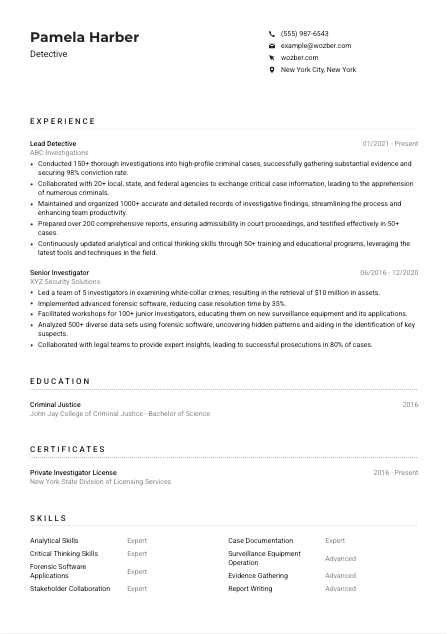
How to write a Detective Resume?
Stepping into the world of crime-solving and investigation requires not just a keen eye for detail but also a resume that highlights your unique skills in the field. If you're aiming to land a Detective position, your resume needs to be as sharp as your investigative instincts. Here, we'll guide you through tailoring your resume to echo the specific demands of your dream job, utilizing Wozber's free resume builder, which is engineered for ATS-compliance and rich in features like ATS-friendly resume templates and an ATS resume scanner for keyword optimization.
Let's embark on this journey to ensure your investigative prowess doesn't go unnoticed.
Personal Details
The personal details section is like your badge in the resume; it introduces who you are. For a Detective role, ensuring this section sets the right tone is crucial. Here's how to tailor it to make sure your introduction is as compelling as the rest of your resume.
1. Name and Badge
Think of your name as the badge on your resume. Make it prominent. Like a badge, it should be easily recognizable and placed at the top. Use a clear, authoritative font that says you mean business.
2. The Title of Your Story
Right below your name, lock in your target by listing the job title you're applying for, "Detective". This not only shows you're focused but also helps in ATS optimization, aligning your resume with the job description.
3. The Wiretap: Contact Information
Ensure your contact info is like a successful wiretap - accurate and functional. Double-check your phone number for any typos, and use a professional email address. Consider including a LinkedIn profile that mirrors your resume.
4. Setting the Scene: Location
The job description calls for someone based in "New York City, New York". Make it clear you're in the right jurisdiction by highlighting your location, assuring there's no need for relocation discussions.
5. Confidential Informants: Professional Profiles
Relevant online profiles can serve as confidential informants, providing deeper insight into your professional background. If you have a portfolio website or a LinkedIn profile showcasing your career achievements, include it.
Takeaway
Your personal details section should open your resume with authority and precision. Like a well-presented badge, it invites trust and professionalism. Ensure it's neat, precise, and perfectly aligned with your target Detective role.





Experience
In the world of law enforcement and investigation, your experience speaks volumes. It's critical to present your past roles in a way that highlights your investigatory achievements and aligns with the needs of a Detective position.
- Conducted 150+ thorough investigations into high‑profile criminal cases, successfully gathering substantial evidence and securing 98% conviction rate.
- Collaborated with 20+ local, state, and federal agencies to exchange critical case information, leading to the apprehension of numerous criminals.
- Maintained and organized 1000+ accurate and detailed records of investigative findings, streamlining the process and enhancing team productivity.
- Prepared over 200 comprehensive reports, ensuring admissibility in court proceedings, and testified effectively in 50+ cases.
- Continuously updated analytical and critical thinking skills through 50+ training and educational programs, leveraging the latest tools and techniques in the field.
- Led a team of 5 investigators in examining white‑collar crimes, resulting in the retrieval of $10 million in assets.
- Implemented advanced forensic software, reducing case resolution time by 35%.
- Facilitated workshops for 100+ junior investigators, educating them on new surveillance equipment and its applications.
- Analyzed 500+ diverse data sets using forensic software, uncovering hidden patterns and aiding in the identification of key suspects.
- Collaborated with legal teams to provide expert insights, leading to successful prosecutions in 80% of cases.
1. Break the Case: Job Requirements
First, act like you're cracking a case. Break down the job description to understand what experiences are most valued. For a Detective, this might include investigations conducted, agencies collaborated with, and evidence processed.
2. Stakeout: Your Roles and Responsibilities
Present your experience like a well-documented stakeout, keeping it chronological and clear. Each role you list should succinctly outline how your contributions have advanced investigations or aided in criminal apprehension.
3. Evidence Collection: Highlight Achievements
Show off your detective work through your accomplishments. Use bullet points to detail your investigative achievements, like a high conviction rate or the successful use of surveillance techniques. Quantifying these accomplishments makes them stand out.
4. Interrogation Tactics: Quantify Achievements
Numbers talk. If you led a team that cracked a case wide open, say how big the team was and what the outcome was. Did you recover a significant amount in assets? Quantify it. This helps paint a picture of your effectiveness.
5. Tip-offs: Relevancy is Key
Like following up on the right tip-offs, ensure each experience listed is relevant to the job at hand. Non-relevant experience can be like a false lead, so focus solely on the cases (roles) that showcase your detective might.
Takeaway
The experience section is your proof of capability. Like a detailed case file, it should show at a glance that you're the right person for the Detective role. Each bullet point is evidence of your expertise, so make every word count.
Education
In the detective field, your educational background lays the foundation for your investigative expertise. Tailoring this section to reflect the job's educational requirements is like presenting evidence that supports your case for the job.
1. Understand the Charges: Key Requirements
The job description specifically asks for a "Bachelor's degree in Criminal Justice or a related field". This is the key piece of evidence you need to present in your resume.
2. Compile the Dossier: Basic Structure
Organize your educational credentials like a dossier. Start with your degree, follow with the institution, and then the date of graduation. Ensure this section is clear and concise - no room for ambiguity.
3. Undercover Work: Tailor Your Degree
If your degree directly aligns with the job (e.g., Bachelor of Science in Criminal Justice), make sure it's unmistakably clear. This direct match is like going undercover; you're perfectly suited for the environment.
4. Informants: Relevant Courses and Achievements
In some cases, listing relevant coursework or special projects can bolster your profile, acting like informants that provide additional insight into your qualifications. However, for seasoned detectives, this might be less necessary.
5. Training Sessions: Continuous Education
The detective field is ever-evolving, with new techniques and technologies continually emerging. Demonstrating your commitment to ongoing education through certificates or special training shows you're keeping pace with the field.
Takeaway
Your education is the core evidence of your readiness for the detective role. Present it in a way that leaves no doubt you have the foundation needed. Remember, every detail contributes to building a convincing case for your candidacy.
Certificates
In the detective profession, certificates are like badges of honor – they signify specialized training and expertise. Showcasing the right certificates on your resume can give you an edge, proving you have the skills and knowledge for the job.
1. Case File: Key Requirements
Start with the essentials required for the role, such as a "Valid state-issued Private Investigator, Detective, or related license." This is non-negotiable and must be prominently listed.
2. Select Your Best Evidence
List certificates that are most relevant and directly related to the job's demands. Think of each certificate as a piece of evidence supporting your case – the more pertinent it is, the stronger your case.
3. Timestamps: Dates Matter
For certifications with validity periods, ensure you include the dates. This provides context and shows that your qualifications are current, which is crucial in a constantly evolving field.
4. On the Beat: Stay Current
The world of crime-solving is dynamic, requiring you to stay on top of new developments. Pursue ongoing learning and certifications to demonstrate your commitment to staying ahead in your field.
Takeaway
Certificates on your resume are like commendations in your career. They not only validate your skills but also showcase your dedication to professional development. Choose wisely and keep them updated to maintain your edge.
Skills
The skills section of your resume is where you can showcase the tools in your investigative toolkit. By aligning this section with the job requirements, you prove that you have the necessary skills to excel in the Detective role.
1. Decipher the Code: Job Requirements
Start by analyzing the job description to identify both the explicit and implicit skills required. Skills like "Analytical Skills" and "Critical Thinking Skills" are your bread and butter in this profession.
2. The Right Equipment: Listing Skills
Once you've identified the required skills, list the ones you possess that align with the job description. Ensure these skills are relevant and tailored, showing you have the exact tools needed for the job.
3. Organization is Key
Keep this section well-organized and focused. Rather than listing every skill you think you have, concentrate on those that will interest the hiring manager and show you're a perfect fit for the Detective role.
Takeaway
Your skills section is a showcase of your professional arsenal. Approach it strategically, ensuring each skill you list directly contributes to painting a picture of a capable, well-equipped Detective. These are the tools that will help you crack not just cases but also the job market.
Languages
In a role that may entail interacting with diverse communities or analyzing statements from various sources, language skills can be a valuable asset. Let's look at how to integrate your linguistic capabilities into your Detective resume effectively.
1. Review the Brief: Job Requirements
Start by checking if specific language requirements are mentioned in the job description. The requirement for "Effective use of the English language" means your fluency in English must be clearly listed.
2. Prioritize Key Languages
List English at the top of your language section as a primary language, showcasing your fluency and ability to communicate effectively, a must-have skill for any Detective.
3. Additional Languages: A Plus
If you speak additional languages, list them as well, especially if they're relevant to the communities you might serve as a Detective. This can showcase your versatility and ability to navigate diverse environments.
4. Be Honest With Your Proficiency
It's crucial to be upfront about your language proficiency levels. Whether you're native, fluent, or have basic knowledge, clarity here can prevent misunderstandings down the line.
5. Tailor to Your Beat
Consider the specific demands of your Detective role. If the position involves work across different states or with international agencies, highlighting your multilingual abilities could be particularly advantageous.
Takeaway
Your ability to speak multiple languages is a unique tool in your investigative toolkit, offering a broader perspective and deeper understanding. Highlight these skills on your resume to show you're prepared for the diverse challenges of detective work.
Summary
The summary section is your chance to present your case to the hiring manager succinctly. It's where you outline who you are, what you've achieved, and why you're the right fit for the Detective role.
1. The Opening Statement
Start with a clear, engaging introduction that captures your career essence. For instance, "Detective with over 8 years of experience in law enforcement" sets the stage for your narrative.
2. Presenting the Evidence
Highlight your unique skills and major accomplishments early on. Mention your proficiency with investigative tools, your analytical skills, and your rate of case closures. Be brief but powerful.
3. Clarity is Key
Your summary should be crisp and to the point. Aim for 3-5 sentences that encapsulate your professional identity and how it aligns with the job at hand. Too much information can dilute the impact.
4. The Call to Action
End your summary with a statement that invites further reading and consideration, such as your eagerness to leverage your skills in a new, challenging Detective role.
Takeaway
Think of your summary as the compelling opening to your professional story. It's your chance to grab the hiring manager's attention and make them want to dive deeper into your resume. Craft it with the care it deserves, ensuring it sets the scene for your experience, skills, and the value you bring as a Detective.
Launching Your Detective Journey
You're now equipped with the knowledge to craft a resume that stands out to hiring managers and passes through ATS filters with ease. Use this guide as your roadmap and Wozber's free resume builder to implement these strategies effortlessly. With an ATS-compliant resume, an ATS-friendly resume template, and by taking advantage of an ATS resume scanner for keyword optimization, you're ready to advance your career in law enforcement.
Your detective work starts here, piecing together a resume that unlocks doors. Go forth with confidence, your next great role awaits.

- Bachelor's degree in Criminal Justice or a related field.
- Minimum of 5 years of experience in law enforcement, investigation, or a related field.
- Proficiency in using investigative tools and techniques, such as surveillance equipment and forensic software.
- Strong analytical and critical thinking skills.
- Valid state-issued Private Investigator, Detective, or related license.
- Effective use of the English language is essential.
- Must be located in New York City, New York.
- Conduct thorough investigations into assigned cases, including gathering evidence, conducting interviews, and analyzing data.
- Collaborate with local, state, and federal agencies to exchange information and coordinate efforts on ongoing cases.
- Maintain accurate and detailed records of all investigative activities and findings.
- Prepare detailed reports and testify in court as necessary.
- Regularly update knowledge and skills through participation in relevant training and educational programs.





